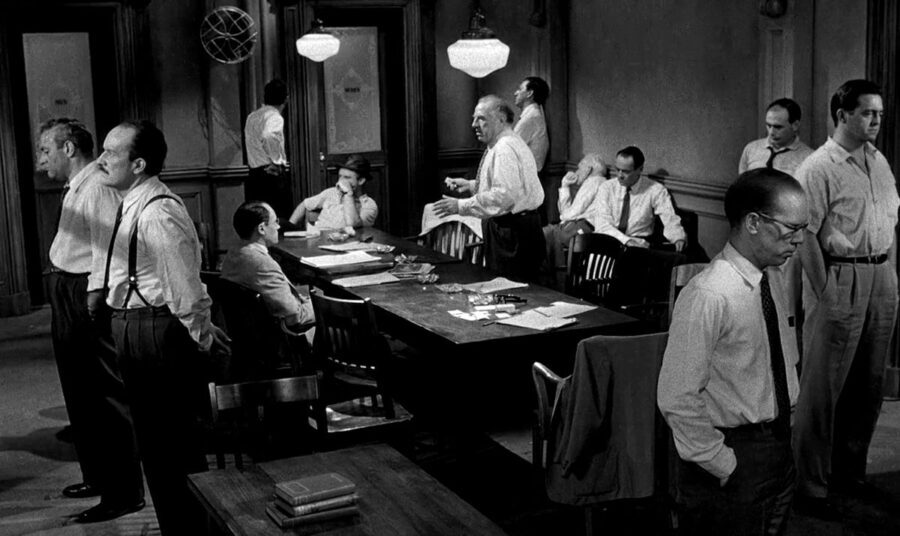Community, Leadership, Experimentation, Diversity, & Education
Pittsburgh Arts, Regional Theatre, New Work, Producing, Copyright, Labor Unions,
New Products, Coping Skills, J-O-Bs...
Theatre industry news, University & School of Drama Announcements, plus occasional course support for
Carnegie Mellon School of Drama Faculty, Staff, Students, and Alumni.
CMU School of Drama
Friday, October 23, 2020
"Twelve Angry Men"; 1950's Courtroom Drama about Confronting Prejudice Still Rings True
The Theatre Times: Back in January, when English director Lindsay Posner visited Tokyo for preparatory meetings to stage the iconic courtroom drama Twelve Angry Men at Bunkamura Theatre Cocoon in Shibuya Ward, he was expecting to return in a few months to a city abuzz with excitement over the Summer Olympics. Instead, the pandemic has put both the Games and international travel on hold — resulting in Posner having to log into Zoom in the early hours of his day to conduct rehearsals from his home in London with an all-Japanese cast eight hours ahead and more than 9,500 kilometers away.
Subscribe to:
Post Comments (Atom)

4 comments:
I’ve watched a film “Twelve Angry Men” during my ethics class in my high school. At that time I only focused to analyze how people were manipulated in different kinds of situations, so it felt new to meet this film again from the perspective of theater student. I was glad that the author pointed out that one of the key point of this film was that the context was not focused on the actual trial, but the attitudes of each jurors. To evaluate such interactions from today’s perspective (and knowing that some of those cases are still present today, although this film was made a few decades ago) was fairly interesting as well. I wonder if this is going to be successful in the theater form though. The aspect that I enjoyed the most from this movie was watching the actors’ detailed facial expressions and detailed behaviors, but these seem difficult to be conveyed in the theatrical form.
Twelve Angry Men has been is one of my favorite plays, and it was really interesting to read this article that shared such an interesting rehearsal process. I watched the movie version before I saw the play, and since then I have been fascinated not only by what I consider to be an excellent work, but also how a play from the 1950s can still ring so true today. It is not hard to imagine how this exact situation could happen today, and I think it is interesting to consider this place being done with a Japanese cast. The drama surrounding a court case and the potential of an innocent person being convicted for a crime they did not commit reads as distinctly American, and it is curious to see it done in Japan. I am so impressed that the director of the show is separate from the cast, and I can imagine that it might potentially allow the cast to bond together in a unique way.
I actually read the novel Twelve Angry Men in eighth grade and I had no idea there was a play version. It is honestly such a powerful story especially because the accused is so young and the stakes are so high. Personally I would really enjoy seeing this performed live because it always intrigued me on how to properly convey the emotions displayed by the jurors. I wonder, in the Japanese production, how accurate the portrayals are. Drawing from life experience is a well known and an often used strategy among actors but I imagine a situation like the one posed in Twelve Angry Men is very Americanized. There are very heavy themes that correlate directly to the United States court system and ideals of freedom/justice that I would love to see an international cast put it on. The juxtaposition between “foreign” actors and a western story is a nice change of pace.
I chose to comment on this article because I am always interested in crime and court dramas, though I have never heard of this title before. And, as the director says, I agree that now is the perfect time to stage the piece because of the civil and political unrest happening in America, as well as several European countries. I do not know how well the topic of the production resonates with Japanese audiences, but the director mentions that the cast was able to take time with the script and really understand where their characters were coming from. However, I am a bit over the dialogue of “We need to have live productions, no matter the cost” I know that the industry must work to an extent, but we still need to exercise extreme caution and really ask ourselves- is art worth the risk of losing co-workers and loved ones? I know that Japan didn’t have real outbreaks of Covid 19 like we did, so I am hoping that they are safe to continue theatre in their country and I wish the production the best of luck
Post a Comment